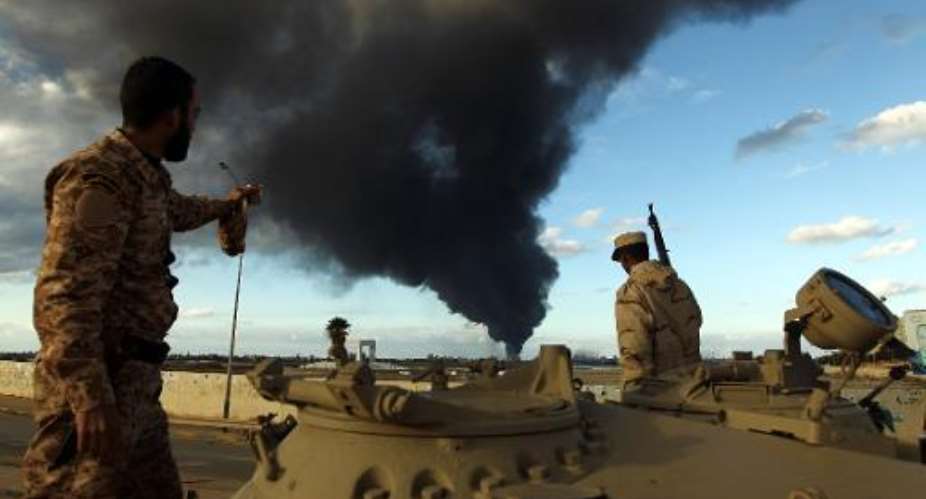Geneva (AFP) - Recent fighting in Libya has killed hundreds of civilians and forced hundreds of thousands to flee their homes, the UN said Tuesday, demanding justice for serious rights violations and possible "war crimes".
In a joint report, the UN human rights office and the UN Support Mission in Libya (UNSMIL) warned of surging violence across the country since May and widespread human rights violations, including abductions of civilians, torture and executions.
"Violations are continuing with impunity. There has been no effort to stop them," Ravina Shamdasani, spokeswoman for the UN human rights agency, told reporters in Geneva.
She warned that many of the abuses being committed across Libya "may amount to war crimes".
Three years after dictator Moamer Kadhafi was toppled and killed in a NATO-backed revolt, Libya is awash with weapons and powerful militias, and run by rival governments and parliaments.
Tuesday's report pointed to an escalation in fighting since mid-October in Benghazi, where forces loyal to General Khalifa Haftar have been battling Islamist militiamen who have taken control of much of Libya's second city.
Some 450 people were killed there in the two months leading up to mid-December, and some 90,000 people had fled, including more than 9,000 seeking shelter in schools, unfinished buildings and open spaces like parking lots, the report said.
Clashes in Benghazi on Monday meanwhile killed another 16 people and wounded dozens, security sources and medics said.
- Humanitarian crisis -
In the western Warshafana area, fighting between rival armed groups had killed some 100 people and injured 500 others between mid-August and mid-October, the report found.
It warned of "a humanitarian crisis" with at least 120,000 people displaced in the area facing "severe shortages of food and medical supplies".
Fighting in the neighbouring Nafusa mountains had also left a reported 170 people dead, and displaced around 5,700 families, it said.
People displaced by the fighting had told UNSMIL that hundreds of houses, farms and businesses had been looted, shelled, burned down, or destroyed by bulldozers.
In the capital Tripoli the humanitarian situation had improved since late August, but activists, journalists and public figures continued to be abducted and threatened, the report found.
"One prominent human rights defender received text messages from armed groups warning him to stop his advocacy work or else his children would be abducted and killed," it said.
Several journalists had been killed, including the October 5 killing of al-Tayeb Isa, the founder of Tuareg Tumsat television, whose body was found riddled with bullets and his car set on fire.
The report painted a horrifying picture of widespread abductions, torture and abuse, as well as reports of summary executions, including beheadings.
A father and son detained at a checkpoint in al-Maya said they had been severely beaten before their captors poured petrol over them and threatened to burn them alive.
In a statement, UN High Commissioner for Human Rights Zeid Ra'ad Al Hussein cautioned commanders and high-ranking officials that they were "criminally liable under international law" for any human rights abuses they commit or order.
They could also be held accountable if they "fail to take reasonable and necessary measures to prevent or punish" war crimes or human rights violations taking place, he said.





 Togo leader Gnassingbe follows father's political playbook
Togo leader Gnassingbe follows father's political playbook
 NDC panics over Bawumia’s visit to Pope Francis
NDC panics over Bawumia’s visit to Pope Francis
 EC blasts Mahama over “false” claims on recruitment of Returning Officers
EC blasts Mahama over “false” claims on recruitment of Returning Officers
 Lands Minister gives ultimatum to Future Global Resources to revamp Prestea/Bogo...
Lands Minister gives ultimatum to Future Global Resources to revamp Prestea/Bogo...
 Wa Naa appeals to Akufo-Addo to audit state lands in Wa
Wa Naa appeals to Akufo-Addo to audit state lands in Wa
 Prof Opoku-Agyemang misunderstood Bawumia’s ‘driver mate’ analogy – Miracles Abo...
Prof Opoku-Agyemang misunderstood Bawumia’s ‘driver mate’ analogy – Miracles Abo...
 EU confident Ghana will not sign Anti-LGBTQI Bill
EU confident Ghana will not sign Anti-LGBTQI Bill
 Suspend implementation of Planting for Food and Jobs for 2024 - Stakeholders
Suspend implementation of Planting for Food and Jobs for 2024 - Stakeholders
 Tema West Municipal Assembly gets Ghana's First Female Aircraft Marshaller as ne...
Tema West Municipal Assembly gets Ghana's First Female Aircraft Marshaller as ne...
 Dumsor is affecting us double, release timetable – Disability Federation to ECG
Dumsor is affecting us double, release timetable – Disability Federation to ECG
